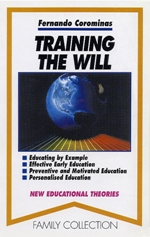Young Children’s Voices in Mathematical Problem Solving
Contributed by Dr Ho Siew Yin and Sng Wei Qin Abbie, from NTUC First Campus, for SingTeach Virtual […]
Read More
By Fernando Corominas (1999), Edificio Palabras, ISBN:84-8239-367-7, 232 pp.
 In a recent seminar entitled, “Bringing up children with personality”, I came across the book Training the Will by Fernando Corominas.
In a recent seminar entitled, “Bringing up children with personality”, I came across the book Training the Will by Fernando Corominas.
It is a self-help guide for teachers and parents about the formation of children and youth into women and men of character. These are people who have the willpower to want to do things, instead of being pressured by their environment, or worse, being forced to do so. The author reminds readers that the child has to be trained to do what is good for its own sake and not because of the promise of reward or fear of punishment.
This includes studying hard, growing up as a responsible citizen, and caring for others. Wanting to do good, as the author says, requires self-control and responsible use of freedom, which are rooted in one’s will.
Being over-concerned about a child’s performance at school and spending money on expensive tutors is not really the way to educate the child. To know certain facts or truth (knowledge), the child has to want to know in the first place. According to the Corominas, if parents only use the same effort to help children want to study, be determined, be responsible and be orderly, then they would develop a set of values and strong willpower.
The book outlines an action plan to help children acquire habits and virtues. For Corominas, forming the will is a good start to good education. In this new century, he believes that what matters most will not be what you know but what you are. This includes the kind of person you are and the values you have such as honesty, diligence at work, positive outlook, loyalty, etc.
This is a convincing argument given that surveys have shown that current employers prefer employees with good values and soft skills. Thus, while education is necessary it may not be sufficient to ensure a promising job in the next century.
Another thing worth sharing is the author’s advice on implementing effective education by inducing stimuli to have children act the way we want them to act. While this may be “as old as mankind”, as the author puts it, it is worth repeating.
He says that effective education exists when positive synergy is generated in the educational process. Positive synergy is produced when additional energy is generated from within the system, beyond the normal effort to teach a goal. The author says that positive synergy can be obtained through proper stimulation by creating a spirit of trust, being tactful and saying things with love and affection. The book is full of examples on how to achieve this.
The book also includes a discussion on intelligence and the will where the author compares the two through their activities (e.g., knowledge acquisition is an activity of the intellect, while wanting to know is an activity of the will).
I would have preferred that the author introduced these two faculties more because it would have been helpful in understanding our internal activities such as reflecting and wanting as compared to other instincts that all living beings have (e.g., instinct for survival). Perhaps, the author wanted to focus more on the practicalities of his central topic.
The book also mentions something about religion which I thought limited the scope of the discussion. While I have nothing against religion, I felt the topic had a more universal application.
This small book is especially helpful for new parents, teachers or anyone who works with youths. There are lot of interesting and helpful points in the book, from child development to educational motivation. It also avoids the technical language that one finds in many research articles and journals, and is easy and fun to read.
I would like to end by quoting the author: “The key to education is a torrent of love.” That’s one sentence that is so full of meaning. Although it sounds a bit romantic when you first hear it, there is truth in it as students are more motivated to learn and cooperate in school if they feel that they are respected and sincerely cared for.